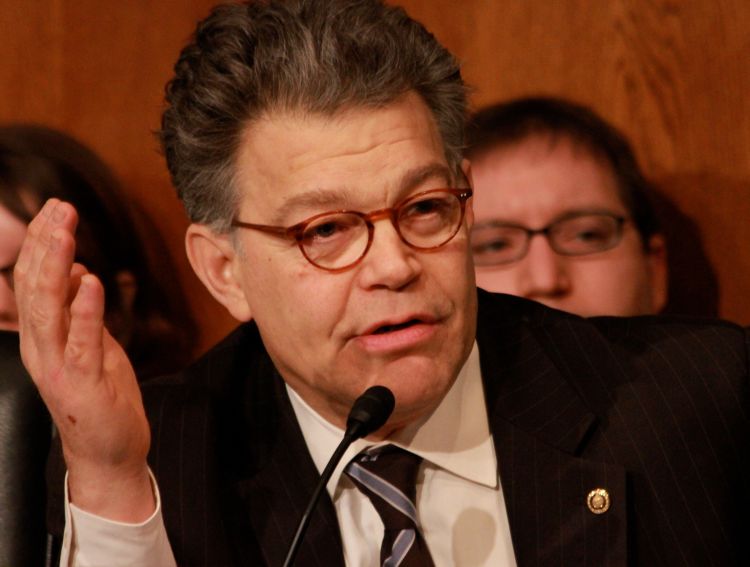Senator Al Franken (D-Minn.) sent a letter Wednesday asking two of the nation’s top federal agencies to look into whether Apple is engaging in anticompetitive behavior in the music streaming market.
The letter is addressed to the heads of the Department of Justice (DOJ) and Federal Trade Commission (FTC).
Senator Franken expressed concern that some of Apple’s business practices in the digital music market have the potential to limit choices and raise music prices for consumers.
He said that the recent launch of Apple Music, a new music steaming service, has brought to light a number of restrictions that competitors face when operating on Apple devices like iPhones or iPads. He’s referring to the 30 percent tax Apple charges competing music streaming services when they sell a subscription through their iOS app.
From the letter:
“Increased competition in the music streaming market should mean that consumers will ultimately benefit through more choices of better products and at lower prices,” wrote Sen. Franken. “I am concerned, however, that Apple’s position as a dominant platform operator may actually undermine many of the potential consumer benefits of its entry into the market. To protect consumer choice and promote greater transparency of pricing, I ask that you review Apple’s business practices with respect to its competitors in the music streaming market.”
(See the full text of Franken’s letter below)
Consumer and industry groups have already started chiming in on Franken’s letter and the possible formal investigation.
The App Association came out hard against Franken’s views today:
“Senator Franken is out of sync when he asserts that the company’s entrance into the music streaming market is anticompetitive,” said the group’s director Morgan Reed in a statement. “The mobile app marketplace is one of the most vibrant ecosystems in the world, and the introduction of Apple Music does nothing to make it less competitive. Further, while app makers make more money on Apple’s platform, it occupies a relatively small share of the global market.”
Another group, Consumer Watchdog, believes Apple is leveraging its popularity to force competing music streaming services to halt free, ad-supported music streaming tiers.
“At issue, in fact, is the proprietary information that Apple possesses about its subscribers’ credit cards and musical preferences, which it is leveraging over music labels in an attempt to rub out free (commercial sponsored) music platforms,” Consumer Watchdog president Jamie Court and privacy director John Simpson wrote in their own letter to the agencies. “In this regard, Apple is utilizing its market power in much the way the company did in setting e-book prices.”
July 22, 2015
The Honorable Loretta Lynch
Attorney General
United States Department of Justice
950 Pennsylvania Avenue, NW
Washington, DC 20530
The Honorable Edith Ramirez
Chairwoman
Federal Trade Commission
600 Pennsylvania Avenue, NW
Washington, DC 20580
Dear Attorney General Lynch and Chairwoman Ramirez:
I am writing to encourage you to examine Apple’s current dealings with app developers to determine whether the company is engaging in anticompetitive behavior in the music streaming market. As the digital music industry continues to evolve, we must ensure that this relatively new market allows for meaningful competition and that consumers have access to important information about the products and services available to them. While I am encouraged to see increased competition in this market, I am concerned about certain business practices that have the potential to limit choices and raise prices for consumers.
One of the most innovative companies of our time, Apple is world-renowned for producing high-quality products and offering excellent customer service. However, the recent launch of Apple Music has brought to light a number of restrictions Apple places on app developers, including its own competitors in the music streaming market, that rely on Apple’s operating system to offer their products and services to all consumers with Apple devices. Apple currently charges a non-negotiable 30 percent fee on revenues from in-app purchases made through apps operating on Apple devices. Apple then enforces this fee through rules and guidelines found in its licensing agreements with app developers. Among other things, these agreements prevent apps from communicating important information to their users, such as why prices for the same product can vary significantly depending on the operating platform or the technology a consumer uses to make the purchase.
In the case of music streaming services, Apple’s licensing agreements have prevented companies from using their apps to inform users that lower prices are available through their own websites, to advertise the availability of promotional discounts, or to complete a transaction directly with a consumer within their app. These types of restrictions seem to offer no competitive benefit and may actually undermine the competitive process, to the detriment of consumers, who may end up paying substantially more than the current market price point.
Increased competition in the music streaming market should mean that consumers will ultimately benefit through more choices of better products and at lower prices. I am concerned, however, that Apple’s position as a dominant platform operator may actually undermine many of the potential consumer benefits of its entry into the market. To protect consumer choice and promote greater transparency of pricing, I ask that you review Apple’s business practices with respect to its competitors in the music streaming market.
I appreciate your attention to this matter.
VentureBeat's mission is to be a digital town square for technical decision-makers to gain knowledge about transformative enterprise technology and transact. Learn More

